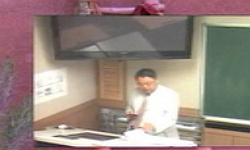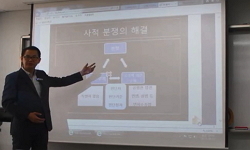이 글은 한국 대중 문화에서 노동 분쟁이 어떻게 묘사되고 시청자가 어떻게 반응하고 법적 의미를 부여하는지를 살펴 본다. 구체적인 사례 연구(case study)는 (온라인 코믹 부문)수상 경력에 ...
http://chineseinput.net/에서 pinyin(병음)방식으로 중국어를 변환할 수 있습니다.
변환된 중국어를 복사하여 사용하시면 됩니다.
- 中文 을 입력하시려면 zhongwen을 입력하시고 space를누르시면됩니다.
- 北京 을 입력하시려면 beijing을 입력하시고 space를 누르시면 됩니다.

Labor Dispute Resolution and Popular Culture in Shaping Viewers’ Legal Consciousness in South Korea
한글로보기https://www.riss.kr/link?id=A107209610
- 저자
- 발행기관
- 학술지명
- 권호사항
-
발행연도
2020
-
작성언어
English
-
주제어
Legal Consciousness ; Law and Film ; Dispute Resolution ; Labor Disputes ; Non-regular Worker ; 법의식 ; 법률과 영상 ; 분쟁해결 ; 노동분쟁 ; 비정규직
-
등재정보
KCI등재
-
자료형태
학술저널
-
수록면
269-294(26쪽)
-
KCI 피인용횟수
0
- DOI식별코드
- 제공처
- 소장기관
-
0
상세조회 -
0
다운로드
부가정보
국문 초록 (Abstract)
법률을 주제로 한 영화와 TV 드라마가 더 많이 등장함에 따라, 온라인 토론 게시판과 소셜 미디어를 통해 시청자의 반응을 살펴보면, 개인들이 법이 사회에서 어떻게 작용하는지에 대한 의미를 부여하는 방법을 알 수 있다. 드라마 대본과 관련하여 이 논문에서는 첫째, 노동자들이 노동 분쟁 과정의 여러 단계에 어떻게 참여하는지를 묻고 있다. 둘째, 이 글에서는 온라인 시청자들이 이러한 법적 사건에 어떻게 반응하고 그들의 일상 생활 경험을 바탕으로 의미를 창출하는지를 묻고 있다. 본 논문에서는 ‘송곳(The Awl)’의 법적 내러티브를 분석하고 시청자의 반응을 압축화(coding)함으로써 대중 문화 매체가 한국의 노동 분쟁 해결에 관한 법의식을 효과적으로 반영하고 형성 할 수 있음을 보여주고 있다.
이 글은 한국 대중 문화에서 노동 분쟁이 어떻게 묘사되고 시청자가 어떻게 반응하고 법적 의미를 부여하는지를 살펴 본다. 구체적인 사례 연구(case study)는 (온라인 코믹 부문)수상 경력에 빛나는 웹툰(송곳)을 바탕으로 한 TV 드라마 시리즈 ‘송곳(The Awl)’으로, 2007년 7월 한국 기업 E-Land가 900명의 비정규직을 해고하는 과정에서 한국 사회에서 크게 논란이 되었던 모습을 보여준다. 당시의 일시해고(lay-off)는 근로자에게 정규 고용 지위를 부여해야하는 (후에)개정된 노동법이 채택되기 전에 발생하였다.
법률을 주제로 한 영화와 TV 드라마가 더 많이 등장함에 따라, 온라인 토론 게시판과 소셜 미디어를 통해 시청자의 반응을 살펴보면, 개인들이 법이 사회에서 어떻게 작용하는지에 대한 의미를 부여하는 방법을 알 수 있다. 드라마 대본과 관련하여 이 논문에서는 첫째, 노동자들이 노동 분쟁 과정의 여러 단계에 어떻게 참여하는지를 묻고 있다. 둘째, 이 글에서는 온라인 시청자들이 이러한 법적 사건에 어떻게 반응하고 그들의 일상 생활 경험을 바탕으로 의미를 창출하는지를 묻고 있다. 본 논문에서는 ‘송곳(The Awl)’의 법적 내러티브를 분석하고 시청자의 반응을 압축화(coding)함으로써 대중 문화 매체가 한국의 노동 분쟁 해결에 관한 법의식을 효과적으로 반영하고 형성 할 수 있음을 보여주고 있다.
다국어 초록 (Multilingual Abstract)
This article examines how labor disputes are portrayed in Korean popular culture and how viewers respond and attribute legal meaning. The specific case study is the television drama series, The Awl, based on an award-winning webtoon (online comic) tha...
This article examines how labor disputes are portrayed in Korean popular culture and how viewers respond and attribute legal meaning. The specific case study is the television drama series, The Awl, based on an award-winning webtoon (online comic) that illustrates the highly controversial lay-off of 900 non-regular workers by the South Korean company E-Land in July 2007. The lay-off occurred before the adoption of the amended Labor Law that required granting regular employment status to the workers. As more legal-themed movies and television dramas appear in Korea, examining viewer responses through online discussion boards and social media gives insight into how individuals attribute meaning to how the law works in society. First, in relation to the drama script, this article asks how the workers engage with different stages of the labor dispute process. Second, this article asks how online viewers respond to these legal events and produce meaning based on their experiences in daily life. From analyzing The Awl’s legal narrative and coding viewers’ responses, this article finds that popular cultural media can effectively reflect and further shape legal consciousness regarding labor dispute resolution in South Korea.
목차 (Table of Contents)
- ABSTRACT
- Ⅰ. Introduction
- Ⅱ. Linking Law-and-Film to Legal Consciousness
- Ⅲ. From the Drama: Attitudes and Actions from the Narrative
- Ⅳ. From the Audience: Viewers’ Responses to the Drama
- ABSTRACT
- Ⅰ. Introduction
- Ⅱ. Linking Law-and-Film to Legal Consciousness
- Ⅲ. From the Drama: Attitudes and Actions from the Narrative
- Ⅳ. From the Audience: Viewers’ Responses to the Drama
- Ⅴ. Conclusion
- 참고문헌
- 국문초록
참고문헌 (Reference)
1 이재협, "한국의 법률직 TV 드라마에 나타난 법의식과 법률가의 이미지 - <애드버킷>에서 <검사 프린세스>까지" 법학연구소 51 (51): 357-410, 2010
2 김정오, "한국의 TV 법정 텍스트와 시민들의 수용태도에 관한 연구" 법과사회이론학회 (38) : 257-288, 2010
3 곽한영, "법의식 연구의 경향에 관한 연구 -법의식의 개념을 중심으로-" 한국법교육학회 6 (6): 1-22, 2011
4 Orit Kamir, "Why ‘Law-and-Film’ and What Does it Actually Mean? A Perspective" 19 (19): 255-278, 2005
5 Michael Asimow, "When Harry Met Perry and Larry: Criminal Defense Lawyers on Television" 1 : 77-98, 2012
6 Jinhee Choi, "Webtoons to promote critical thinking in neo-liberal South Korea: A thematic analysis of Awl social justice themes" 4 (4): 111-127, 2018
7 Jennifer Jihye Chun, "The Struggles of Irregularly-Employed Workers in South Korea, 1999-2012"
8 George Ogle, "SOUTH KOREA: DISSENT WITHIN THE ECONOMIC MIRACLE" 1990
9 Michael W. McCann, "RIGHTS AT WORK: PAY EQUITY REFORM AND THE POLITICS OF LEGAL MOBILIZATION 7" 1994
10 E.A. Hoffmann, "Legal consciousness and dispute resolution: Different disputing behavior at two similar taxicab companies" 28 (28): 691-716, 2003
1 이재협, "한국의 법률직 TV 드라마에 나타난 법의식과 법률가의 이미지 - <애드버킷>에서 <검사 프린세스>까지" 법학연구소 51 (51): 357-410, 2010
2 김정오, "한국의 TV 법정 텍스트와 시민들의 수용태도에 관한 연구" 법과사회이론학회 (38) : 257-288, 2010
3 곽한영, "법의식 연구의 경향에 관한 연구 -법의식의 개념을 중심으로-" 한국법교육학회 6 (6): 1-22, 2011
4 Orit Kamir, "Why ‘Law-and-Film’ and What Does it Actually Mean? A Perspective" 19 (19): 255-278, 2005
5 Michael Asimow, "When Harry Met Perry and Larry: Criminal Defense Lawyers on Television" 1 : 77-98, 2012
6 Jinhee Choi, "Webtoons to promote critical thinking in neo-liberal South Korea: A thematic analysis of Awl social justice themes" 4 (4): 111-127, 2018
7 Jennifer Jihye Chun, "The Struggles of Irregularly-Employed Workers in South Korea, 1999-2012"
8 George Ogle, "SOUTH KOREA: DISSENT WITHIN THE ECONOMIC MIRACLE" 1990
9 Michael W. McCann, "RIGHTS AT WORK: PAY EQUITY REFORM AND THE POLITICS OF LEGAL MOBILIZATION 7" 1994
10 E.A. Hoffmann, "Legal consciousness and dispute resolution: Different disputing behavior at two similar taxicab companies" 28 (28): 691-716, 2003
11 David Alan Black, "Law in film: Resonance and Representation (1999); Stefan Machura and Stefan Ulbrich, Law in Film: Globalizing the Hollywood Courtroom Drama" 28 (28): 117-132, 1999
12 Stefan Machura, "Law and Film: Introduction" 28 (28): 1-8, 2001
13 Eric Smoodin, "LAW ON THE SCREEN" 2005
14 International Labour Organization, "Industrial Relations Data"
15 Austin Sarat, "Imagining the law of the father: loss, dread, and mourning in The Sweet Hereafter" 34 (34): 46-, 2000
16 Austin Sarat, "Imagining Legality: Where Law Meets Popular Culture" Univ. Alabama Press 2011
17 S.E. Merry, "GETTING JUSTICE AND GETTING EVEN: LEGAL CONSCIOUSNESS AMONG WORKING-CLASS AMERICANS" 1990
18 Stuart Hall, "Culture, media, language" 1973
19 Onotina Jeiva Elinwa, "Audience Readings and Meaning Negotiation in the Film Viewing Space: An Ethnographic Study of Nollywood’s Viewing Center Audiences" 10 (10): 1-12, 2020
동일학술지(권/호) 다른 논문
-
- 인하대학교 법학연구소
- 백경희(Baek, Kyounghee)
- 2020
- KCI등재
-
- 인하대학교 법학연구소
- 김동주(Kim, Dong Joo)
- 2020
- KCI등재
-
반환된 선하증권의 법적 성질과 선박대리점의 법적 지위에 대한 고찰 - 대법원 2019. 4. 11. 선고 2016다276719 판결의 평석을 중심으로 -
- 인하대학교 법학연구소
- 이정원(Lee, Jung-won)
- 2020
- KCI등재
-
2020년 개정 「아동학대범죄의 처벌 등에 관한 특례법」에 대한 비판적 검토
- 인하대학교 법학연구소
- 강동욱(Kang, Dong Wook)
- 2020
- KCI등재
분석정보
인용정보 인용지수 설명보기
학술지 이력
| 연월일 | 이력구분 | 이력상세 | 등재구분 |
|---|---|---|---|
| 2027 | 평가예정 | 재인증평가 신청대상 (재인증) | |
| 2021-01-01 | 평가 | 등재학술지 유지 (재인증) |  |
| 2018-01-01 | 평가 | 등재학술지 유지 (등재유지) |  |
| 2015-01-01 | 평가 | 등재학술지 유지 (등재유지) |  |
| 2011-01-01 | 평가 | 등재학술지 선정 (등재후보2차) |  |
| 2010-01-01 | 평가 | 등재후보 1차 PASS (등재후보1차) |  |
| 2008-01-01 | 평가 | 등재후보학술지 선정 (신규평가) |  |
학술지 인용정보
| 기준연도 | WOS-KCI 통합IF(2년) | KCIF(2년) | KCIF(3년) |
|---|---|---|---|
| 2016 | 1.12 | 1.12 | 1.05 |
| KCIF(4년) | KCIF(5년) | 중심성지수(3년) | 즉시성지수 |
| 0.97 | 0.95 | 1.123 | 0.14 |





 DBpia
DBpia







